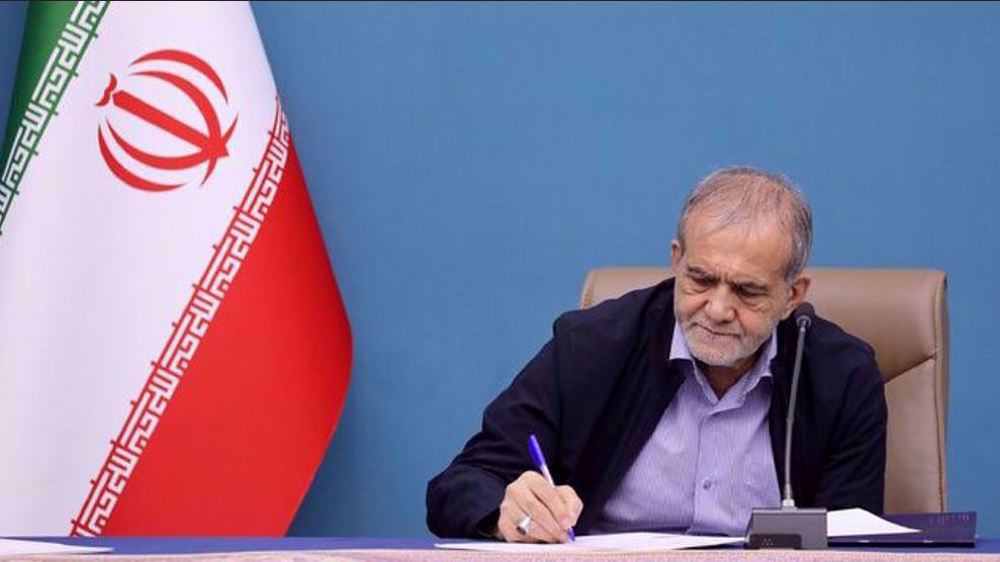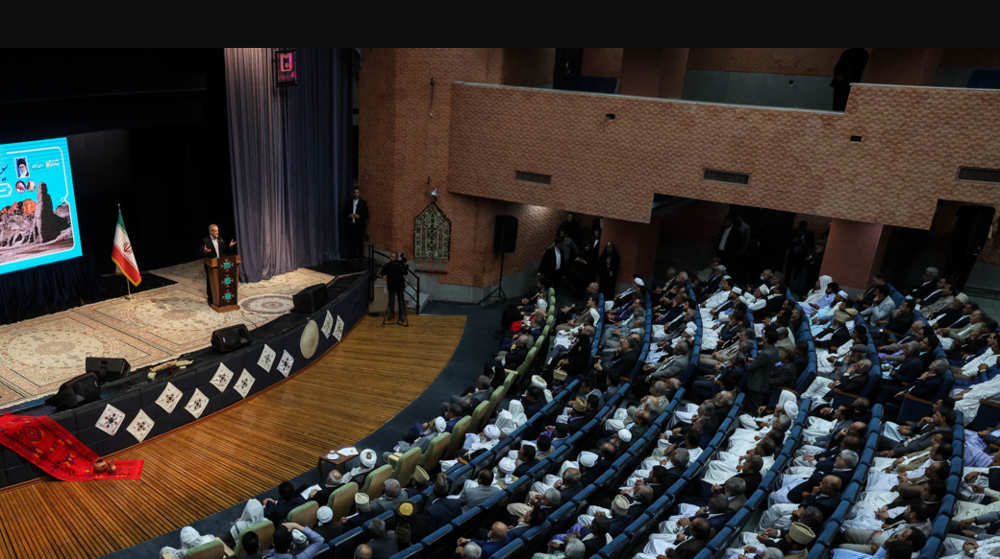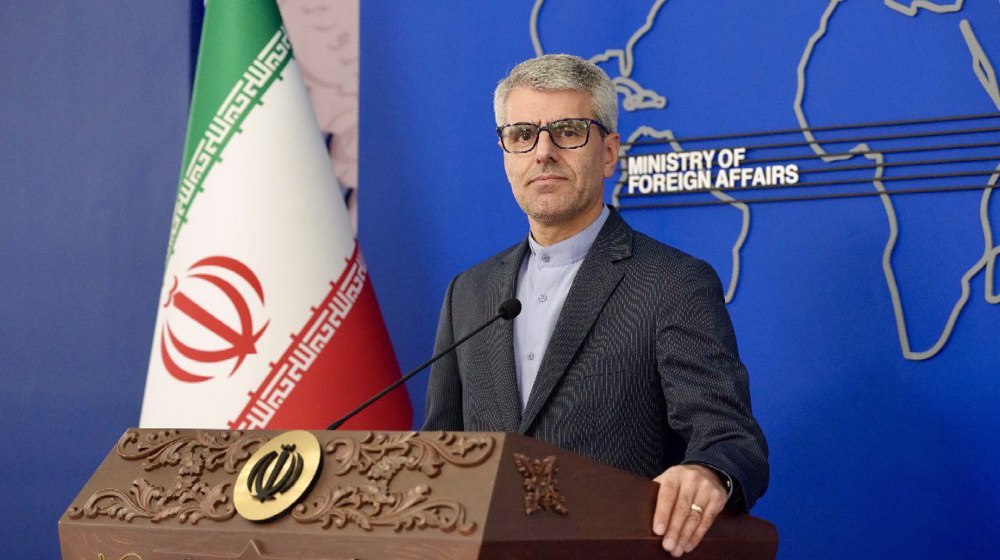Iran's foreign minister in G7 venue, no talks with US on agenda: Spokesman
Iran's Foreign Minister Mohammad Javad Zarif has arrived in the French city of Biarritz where a meeting of the seven top economic powers of the world, known as G7, is going on to discuss with French officials the recent initiatives offered by the two countries’ presidents.
The spokesman for the Iranian Foreign Ministry, Abbas Mousavi, said in a tweet on Sunday that the country’s top diplomat had landed in the French city at the official invitation of his French counterpart, Jean-Yves Le Drian, to continue consultations on the recent initiatives proposed by Iran's President Hassan Rouhani and his French counterpart, Emmanuel Macron.
🇮🇷به دعوت لودریان وزیر امور خارجه فرانسه، دکتر محمد جواد ظریف وزیر امور خارجه کشورمان برای ادامه رایزنی ها درخصوص ابتکارات اخیر میان روسای جمهور ایران و فرانسه، وارد شهر بیاریتز محل برگزاری اجلاس سران گروه هفت شد.
— S.A MOUSAVI (@SAMOUSAVI9) August 25, 2019
در این سفر با هیات آمریکایی ملاقات یا مذاکره ای صورت نخواهد گرفت.
“There will be no talks with the American delegation [to the G7 summit] in this trip,” Mousavi said.
Iranian Foreign Ministry spokesperson confirms that #Iran's Foreign Minister Javad Zarif has arrived in #Biarritz at the invitation of French foreign minister. There will be no meetings or talks with the American delegation, Mousavi said.#G7Biarritz @Jzarif @JY_LeDrian #France pic.twitter.com/OQJ0YDdt01
— Press TV (@PressTV) August 25, 2019
A French presidency official was quoted by Reuters as saying that Zarif is in talks with his French counterpart on the sidelines of a G7 summit to discuss what conditions would de-escalate tensions between Washington and Tehran.
"Zarif came to Paris on Friday with Iranian propositions which obviously must be refined," the French official said, adding, "Yesterday there was a substantial discussion between G7 leaders and it is important to now update Zarif in order to keep closing the gap...on the conditions with which we could de-escalate the tensions and create breathing space for negotiations."
The unnamed French official also emphasized that no discussions have been planned between Iranian and American officials at this stage.
Later on Sunday, Zarif took to his official Twitter page, saying that he had met with the French president as “Iran's active diplomacy in pursuit of constructive engagement continues.”
Iran's active diplomacy in pursuit of constructive engagement continues.
— Javad Zarif (@JZarif) August 25, 2019
Met @EmmanuelMacron on sidelines of #G7Biarritz after extensive talks with @JY_LeDrian & Finance Min. followed by a joint briefing for UK/Germany.
Road ahead is difficult. But worth trying. pic.twitter.com/oXdACvt20T
Earlier on Sunday, Macron said G7 leaders had agreed joint action on Iran to defuse tensions and open a new round of negotiation with Tehran.
"We agreed on what we wanted to say jointly on Iran," Macron told LCI television, adding, “There is a message from the G7 on our objectives and the fact that we share them is important, which avoids divisions that in the end weaken everybody."
"Everyone wants to avoid a conflict, Donald Trump was extremely clear on that point."
Macron, however, noted that he had not been given a formal mandate from G7 leaders to pass messages to Iran, but that he would continue to hold talks with Tehran in the coming weeks to defuse tensions, Reuters reported.
Zarif met with the French president on Friday after a tour of Scandinavian countries after which he said he had "constructive" negotiations with Macron on ways to salvage an international nuclear deal signed between Iran and then P5+1 countries back in 2015.
"France has offered proposals to Iran about ways to implement the JCPOA (the nuclear accord, officially known as the Joint Comprehensive Plan of Action) and steps that the sides are required to take (to save the deal)," Zarif said.
He added that Iran has also presented proposals so that the JCPOA would be implemented completely.
Iran's top diplomat noted that Iranian President Hassan Rouhani and his French counterpart have held telephone conversations over recent weeks and said his meeting with Macron was also held in continuation of talks between the two presidents.
Iran and the five permanent members of the United Nations Security Council – the United States, France, Britain, Russia and China – plus Germany signed the nuclear agreement on July 14, 2015 and started implementing it on January 16, 2016.
Under the JCPOA, Iran undertook to put limits on its nuclear program in exchange for the removal of nuclear-related sanctions.
However, US President Donald Trump pulled his country out of the international nuclear deal in May last year and stepped up sanctions on the Islamic Republic.
Macron has recently stepped up diplomatic contacts with Tehran in a bid to allegedly cease the US economic war against Iran and deescalate tensions in the region.
US House passes bill targeting charities and pro-Palestine groups
Hezbollah attacks Israeli forces after Lebanese homes blown up
World leaders, states hail ICC arrest warrants for Netanyahu, Gallant
MP: US accountable for possible Israeli 'foolishness' to attack Iraq
VIDEO | Israeli policies strangle Palestinian agriculture, economy
Iran's president offers condolences to Pakistan over terrorist attack
Canada’s Yukon town council at standstill over refusing oath to King Charles
Yemen's Houthi calls for jihad to protect Palestine against Israel











 This makes it easy to access the Press TV website
This makes it easy to access the Press TV website